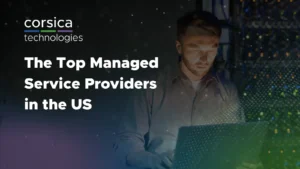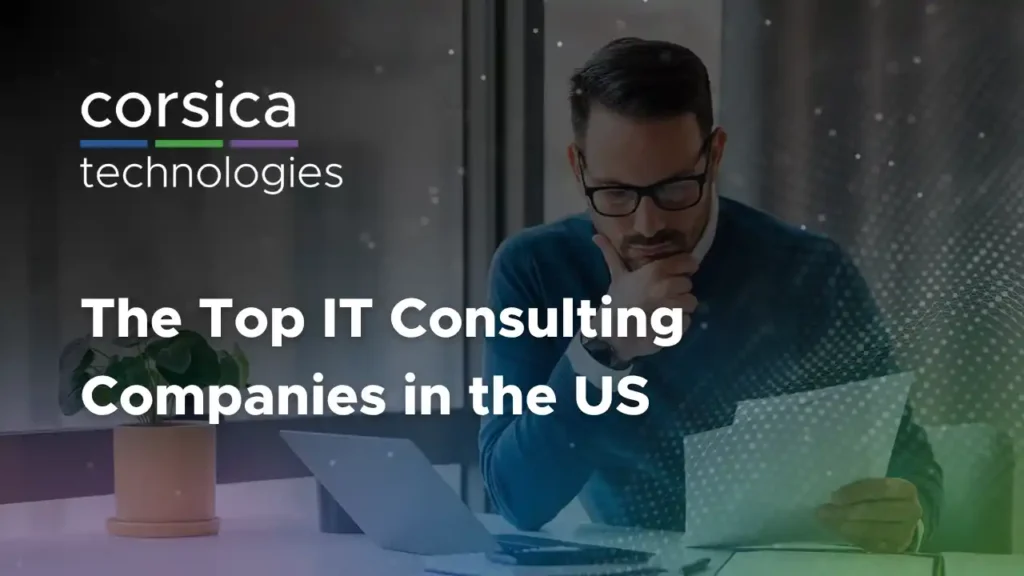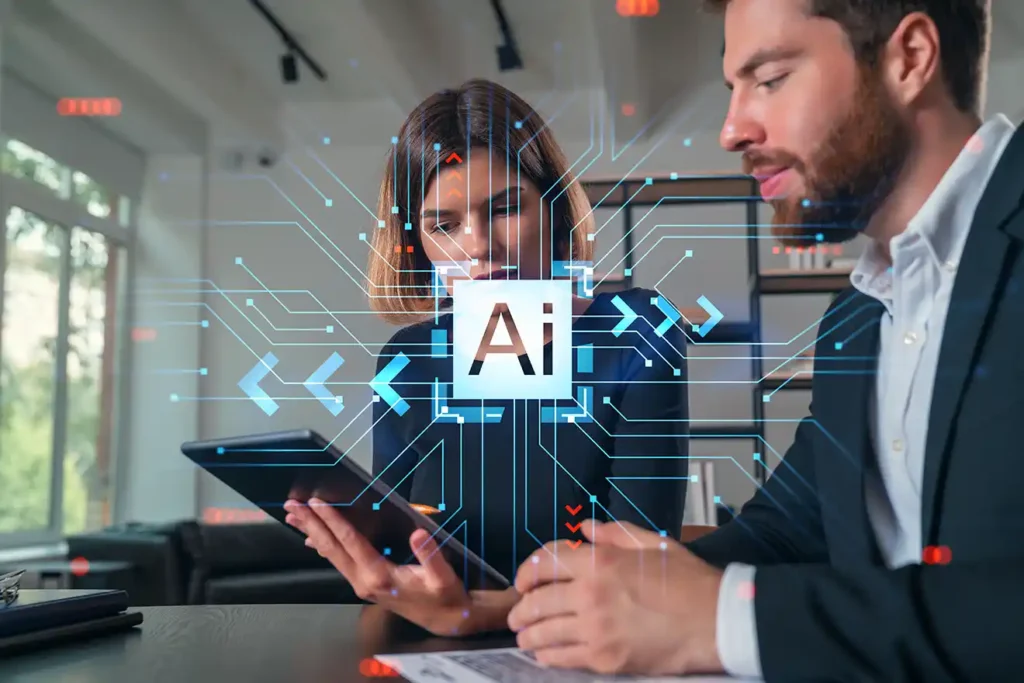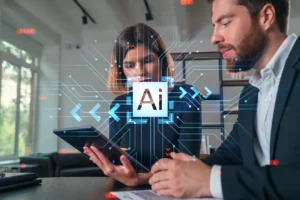AI is no longer a far-off concept; it’s here, and it’s already reshaping how we work. But with the rapid pace of development, it can be tough to separate the hype from reality.
Which AI strategies are effective in today’s workplace?
To get a clearer picture, Corsica Technologies sponsored a roundtable discussion with five leaders in the world of AI, hosted by Integrated Media Publishing. You can read the full article here.
The conversation, which included our own CISO, Ross Filipek, covered everything from the future of jobs to the challenges of AI adoption. Here’s a look at what these experts had to say.
Key points:
- AI will cause a reallocation of employment, not mass unemployment. Repetitive, data-entry-style roles are most at risk, but new opportunities will emerge.
- Data privacy and security are significant barriers to AI adoption, especially for small businesses. A lack of national regulation in the U.S. creates a complex compliance landscape.
- AI’s impact on cybersecurity is a double-edged sword. It provides powerful tools for defense but also enables more sophisticated attacks.
- The future of AI in South Carolina hinges on partnerships between universities, industry, and government to build a talent pipeline and provide necessary infrastructure.
AI expert roundtable participants:
- Justin Brandenburg, Senior Solicitor Architect Team Lead, Nvidia
- Ross Filipek, CISO, Corsica Technologies
- Rich Heimann, Director of Artificial Intelligence, State of South Carolina
- Dan Rundle, CEO, Worthwhile
- Ramtin Zand, Director, Intelligent Circuits, Architectures, and Systems Lab, University of South Carolina




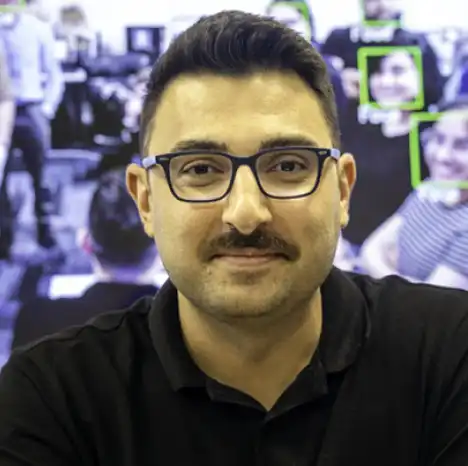
Will AI take your job? Not exactly.
One of the biggest questions surrounding AI is its impact on employment. While the fear of mass unemployment is common, the expert panel agreed that the reality is more nuanced. As Dan Rundle, CEO of Worthwhile, put it:
“What we see is not mass unemployment as a result of this productivity gain, but massive reallocation of employment. Jobs are going to look fundamentally different… as a result of this technology.”
Ross Filipek, CISO at Corsica Technologies, echoed this sentiment, adding that the jobs most likely to be replaced are those involving repetitive tasks:
“I think the nature of certain job roles, like the repetitive tasks, talking about things like data entry folks or administrative assistants… clerks, positions like that, are more and more going to be replaced by AI. But I think that AI also can have the effect of creating positions that don’t necessarily exist now.”
While some jobs may be replaced, the panel also discussed how AI will create new opportunities and even expand businesses. Ramtin Zand, Director of the Intelligent Circuits, Architectures, and Systems Lab at the University of South Carolina, argued that companies may not actually reduce their workforces:
“Firms, I don’t think they will get leaner. If anything, they might even expand because of the opportunities that are provided by AI. As a nation, I don’t think we’re going to lose jobs. But the individual people will be affected, and for some time they have to catch up to be able to use AI as a tool.”
The human element: Can AI replace empathy?
While AI is poised to take over repetitive tasks, what about jobs that require a human touch? The panel agreed that roles requiring empathy and critical judgment, such as those in healthcare, are safe for now.
“Definitely. I think healthcare, so physicians, nurses, even today make heavy use of AI-assisted tools, but those jobs themselves, any position that requires some empathy, human touch, the ability to make critical judgments. I think it’s going to be a long time before we see AI replacing doctors.” – Ross Filipek, CISO, Corsica Technologies
However, Rich Heimann, South Carolina’s Director of Artificial Intelligence, offered a thought-provoking counterpoint, suggesting that our perception of empathy might be more flexible than we think:
“I think the conventional wisdom is that empathy is going to be one of those things that AI is never going to replace. I think it’s going to be exactly the thing it replaces.”
Heimann argues that humans have a tendency to anthropomorphize objects, and we may eventually accept AI’s behavior as genuine empathy. This raises fascinating questions about the future of human-computer interaction and what we truly value in our relationships, both personal and professional.
The elephants in the room: Privacy and security
While the potential of AI is exciting, the panelists were quick to point out the hurdles that stand in the way of widespread adoption, especially for small businesses. Data privacy and security are at the top of the list.
As Ross Filipek explained, the lack of a national privacy regulation in the U.S. creates a confusing and challenging environment for businesses:
“You’re starting to have these different states, like California, coming up with their own privacy laws. I think operationally right now, it can make it very difficult for a lot of organizations to keep tabs on what they’re required to do for residents of each state before they even get into the potential of using AI to help crunch numbers and things like that.”
The Future of Artificial Intelligence In the Workplace
Get the full article PDF.
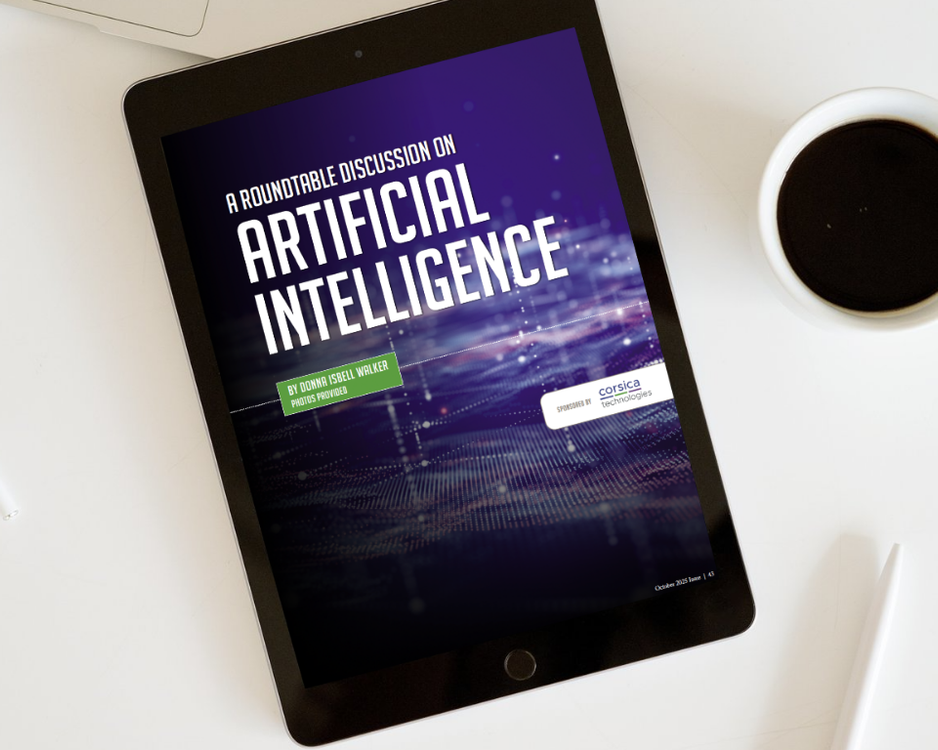
AI in cybersecurity: A double-edged sword
Nowhere is the dual nature of AI more apparent than in cybersecurity. On one hand, it offers powerful tools to help defenders protect against threats. On the other, it gives attackers the ability to craft more sophisticated and convincing attacks.
Ross Filipek provided insight into how Corsica Technologies is leveraging AI to enhance its cybersecurity services:
“If you think about it, you can only control what you can see. So when you go about trying to design a cybersecurity program, step one is getting as much visibility into the environment as you can… It really behooves us as service providers to help our analysts comb through all that and automate searches. We have to provide AI-assisted technologies for what our security analysts are doing.”
However, he also warned that the “bad guys” are using the same technology to their advantage, particularly when it comes to phishing attacks:
“If you think back five years ago, 10 years ago, it was pretty easy to spot things like phishing attacks. Half the words would be spelled wrong, written in poor grammar… That’s no longer the case. We’re seeing that even non-native English speakers can leverage AI-assisted tools to write perfectly convincing phishing emails.”
This highlights the critical need for businesses to adopt advanced cybersecurity measures that can keep pace with the evolving threat landscape. It’s no longer enough to rely on spotting obvious red flags; the game has changed, and AI is playing for both teams.
The future of AI in South Carolina
The roundtable concluded with a discussion on the future of AI in South Carolina. The panelists agreed that the state has a unique opportunity to become a leader in AI, particularly in manufacturing and military applications. However, success will depend on collaboration and investment in the state’s workforce.
As Ramtin Zand explained:
“I believe it’s very important to form partnerships between universities, industry, and government. Creating a pipeline of potential workers is extremely important.”
Dan Rundle echoed this sentiment, emphasizing the role of the startup community:
“If we believe that AI is a playing field leveler between smaller and bigger players and markets, then I would look to the startup community in South Carolina, and I would put energy, time, and money there.”
What’s next for your business?
As the roundtable discussion made clear, AI is a transformative technology that presents both opportunities and challenges. For businesses, the key is to approach AI strategically, with a clear understanding of the potential benefits and risks. It’s not about adopting AI for the sake of it, but about leveraging it to enhance your strengths and achieve your business goals.
As Ross Filipek explained:
“Gradual adoption is going to be the best path forward.”
If you’re ready to explore how AI can help your business, we’re here to help. At Corsica Technologies, we can collaborate with you to develop an AI strategy that’s right for you. Contact us today to learn more.
Download the full article PDF here.

Want to learn more about the future of AI in the workplace?
Reach out to schedule a consultation with our security specialists.



